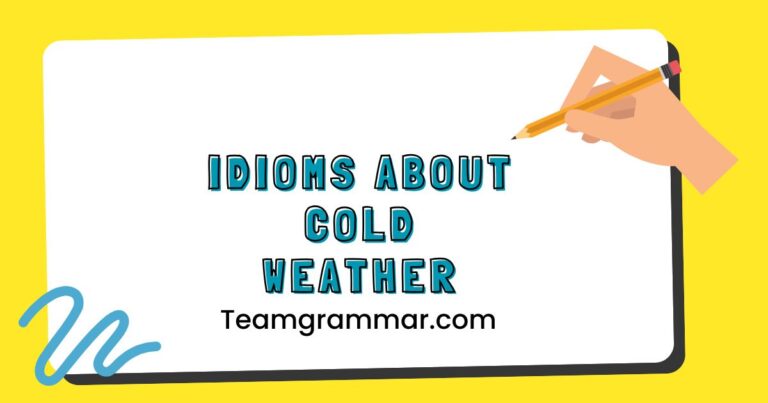35 Idioms for Friends: A Comprehensive Guide
Understanding idioms related to friendship enriches your English vocabulary and enhances your ability to communicate naturally and effectively. These expressions, often colorful and figurative, capture the nuances of relationships in ways that literal language cannot.
Mastering these idioms allows you to express yourself more vividly, comprehend conversations more easily, and connect with native speakers on a deeper level. This guide is designed for English language learners of all levels who wish to expand their knowledge of friendship-related idioms and improve their overall language proficiency.
Table of Contents
- Introduction
- Definition of Idioms for Friends
- Structural Breakdown
- Types and Categories of Friendship Idioms
- Examples of Idioms for Friends
- Usage Rules for Friendship Idioms
- Common Mistakes with Friendship Idioms
- Practice Exercises
- Advanced Topics
- Frequently Asked Questions
- Conclusion
Definition of Idioms for Friends
Idioms for friendsare expressions or phrases whose meanings cannot be understood from the literal definitions of the individual words that make them up. Instead, they carry a figurative or symbolic meaning, often rooted in cultural context and shared understanding.
In the context of friendship, these idioms capture various aspects of relationships, such as loyalty, closeness, conflict, and shared experiences. They provide a colorful and concise way to express complex emotions and dynamics that exist between friends.
Idioms function as a type of figurative language, adding depth and nuance to communication. They are classified based on their grammatical structure and the concepts they represent.
They can be verbal idioms (involving verbs), nominal idioms (involving nouns), or prepositional idioms (involving prepositions). Understanding the context in which an idiom is used is crucial for accurate interpretation.
Misinterpreting an idiom can lead to confusion or miscommunication.
The function of idioms extends beyond mere vocabulary enhancement; they reflect cultural values and shared experiences. By using idioms effectively, speakers and writers can demonstrate a deeper understanding of the language and culture.
This, in turn, fosters stronger connections with native speakers and enhances overall communication skills. Moreover, idioms often provide a more succinct and impactful way to convey meaning compared to literal language.
For instance, saying someone is “thick as thieves” communicates a level of close friendship that would require several sentences to describe literally.
Structural Breakdown
The structure of idioms can vary significantly, but they generally consist of a fixed sequence of words that must be used together to convey the intended meaning. The individual words themselves may have common meanings, but when combined in a specific order, they create a new, figurative meaning.
Understanding the structural components of idioms can help learners recognize and use them more effectively.
Idioms often include verbs, nouns, adjectives, and prepositions. The arrangement of these elements is crucial, as altering the order or substituting words can destroy the idiom’s meaning.
For example, the idiom “bury the hatchet” cannot be changed to “bury the axe” or “hide the hatchet” without losing its intended meaning of making peace after a conflict. The fixed nature of idioms is what distinguishes them from regular phrases.
Analyzing the structural patterns of idioms can reveal underlying themes and cultural insights. Some idioms are based on historical events or customs, while others are derived from everyday experiences.
By studying the structure and origin of idioms, learners can gain a deeper appreciation for the richness and complexity of the English language. Furthermore, recognizing common structural patterns can aid in the memorization and recall of idioms.
Types and Categories of Friendship Idioms
Idioms About Loyalty and Support
These idioms describe the unwavering support and commitment that friends offer each other. They often highlight the idea of being there for someone through thick and thin, and standing by them in times of need.
These idioms emphasize the reliability and dependability that are essential qualities of true friendship.
Idioms About Closeness and Intimacy
These idioms express the deep connection and understanding that exists between close friends. They often involve sharing personal thoughts, feelings, and experiences.
These idioms emphasize the comfort and trust that allow friends to be themselves around each other, without fear of judgment.
Idioms About Conflict and Distance
These idioms describe situations where friendships are strained or broken due to disagreements, misunderstandings, or betrayals. They often involve expressions of anger, resentment, or sadness.
These idioms highlight the challenges and complexities that can arise in even the closest of friendships.
Idioms About Shared Experiences
These idioms refer to the memories and moments that friends have created together. They often involve reminiscing about past events, inside jokes, or common interests.
These idioms emphasize the bond that is formed through shared experiences and the lasting impact they have on the friendship.
Examples of Idioms for Friends
Examples of Loyalty and Support Idioms
The following table provides examples of idioms that describe loyalty and support in friendships. Each idiom is accompanied by a definition and an example sentence to illustrate its use.
| Idiom | Definition | Example Sentence |
|---|---|---|
| Through thick and thin | Through good times and bad times. | We’ve been friends through thick and thin. |
| Stand by someone | To support or defend someone, especially when they are in trouble. | I will always stand by my best friend, no matter what. |
| Be there for someone | To be available to support and help someone when they need it. | You know you can always count on me; I’ll be there for you. |
| Have someone’s back | To support or protect someone, especially from attack or criticism. | Don’t worry, I’ve got your back in the meeting. |
| A shoulder to cry on | Someone who is willing to listen to your problems and offer comfort. | After the breakup, she needed a shoulder to cry on. |
| Ride or die | Extremely loyal and supportive, no matter what. | They’re ride or die friends, always there for each other. |
| In someone’s corner | Supporting someone, especially in a competition or dispute. | I’m always in your corner, cheering you on. |
| Stick up for someone | To defend or support someone who is being criticized or attacked. | He always sticks up for his friends when they’re being bullied. |
| Be a rock | To be a source of strength and stability for someone. | During the crisis, she was a rock for her family. |
| Go to bat for someone | To support or defend someone, especially by speaking on their behalf. | I’ll go to bat for you if you need a reference. |
| Take the fall | To accept blame or punishment for someone else’s mistake. | He took the fall for his friend to protect him. |
| Be a friend in need | Someone who helps you when you are in trouble or need assistance. | He proved to be a friend in need when I lost my job. |
| Be a port in a storm | To provide safety and comfort during a difficult time. | Her house was a port in a storm for many during the hurricane. |
| Go the extra mile | To do more than what is expected or required. | She always goes the extra mile for her friends. |
| Have someone’s back | To support and protect someone. | “I’ve got your back,” he told his friend. |
| Stand shoulder to shoulder | To stand together to support each other. | They stood shoulder to shoulder during the crisis. |
| Always there through thick and thin | Always there to support you during good and bad times. | He was always there through thick and thin. |
| Be a true friend | To be a genuine and supportive friend. | He proved to be a true friend in times of need. |
| Never leave a friend behind | Always support your friend. | He would never leave a friend behind. |
| To be a pillar of strength | Someone who provides unwavering support and stability during tough times. | She was a pillar of strength for her friend after her loss. |
| To have each other’s backs | To support and protect each other in any situation. | They always have each other’s backs, no matter what. |
| To be a confidant | Someone to whom you can confide your secrets and trust. | She is a confidant to all her friends, keeping their secrets safe. |
| To be a staunch ally | Someone who is a strong and reliable supporter. | He is a staunch ally in all their endeavors. |
Examples of Closeness and Intimacy Idioms
The following table provides examples of idioms that describe closeness and intimacy in friendships. Each idiom is accompanied by a definition and an example sentence to illustrate its use.
| Idiom | Definition | Example Sentence |
|---|---|---|
| Thick as thieves | Very close friends who share secrets and experiences. | They are thick as thieves; they do everything together. |
| Two peas in a pod | Very similar and always together. | They’re like two peas in a pod – they have so much in common. |
| Bury the hatchet | To make peace after a conflict. | After years of arguing, they decided to bury the hatchet. |
| Bosom buddies | Very close friends. | They’ve been bosom buddies since kindergarten. |
| Close to someone’s heart | Very important or dear to someone. | This memory is close to my heart. |
| Soulmate | Someone with whom you have a deep and natural affinity. | I believe that she is my soulmate. |
| Kindred spirits | People who share the same interests, attitudes, and feelings. | They are kindred spirits who enjoy the same hobbies. |
| Laughing in the same side of the face | To share the same sense of humor. | They are always laughing on the same side of the face. |
| Get on like a house on fire | To become friends very quickly and have a lot in common. | They get on like a house on fire when they first meet. |
| Cut from the same cloth | Having similar qualities or characteristics. | They are cut from the same cloth, sharing similar values. |
| Birds of a feather | People who are similar and often spend time together. | Birds of a feather flock together. |
| Inseparable | Unable to be separated; always together. | They are inseparable, doing everything together. |
| Like two fingers on one hand | Very close and always together. | They are like two fingers on one hand. |
| Know someone inside out | To know someone very well. | I know her inside out after all these years. |
| Share a brain | To think alike or have the same ideas. | Sometimes it seems like they share a brain. |
| Have a special bond | To have a strong and close connection. | They have a special bond that can’t be broken. |
| Share secrets | To confide in each other. | They share secrets and trust each other completely. |
| Understand each other | To have a mutual understanding. | They understand each other without needing to speak. |
| Be on the same wavelength | To think and understand in a similar way. | They are on the same wavelength. |
| To be two of a kind | To be very similar in personality and behavior. | They are two of a kind, always causing mischief together. |
| To have a heart-to-heart | To have a deep and intimate conversation. | They had a heart-to-heart and resolved their issues. |
| To be joined at the hip | To be extremely close and inseparable. | They are joined at the hip, always doing everything together. |
| To be partners in crime | To be friends who enjoy doing mischievous things together. | They are partners in crime, always up to some prank. |
Examples of Conflict and Distance Idioms
The following table provides examples of idioms that describe conflict and distance in friendships. Each idiom is accompanied by a definition and an example sentence to illustrate its use.
| Idiom | Definition | Example Sentence |
|---|---|---|
| Drift apart | To gradually become less close to someone. | Over the years, we started to drift apart. |
| Fall out with someone | To have a serious argument and stop being friends. | They fell out with each other over a misunderstanding. |
| On the outs | Having a disagreement or not being on good terms with someone. | They’ve been on the outs since their argument last week. |
| At loggerheads | In strong disagreement. | They are at loggerheads over the project’s direction. |
| Rub someone the wrong way | To annoy or irritate someone. | His arrogance always rubs me the wrong way. |
| Give someone the cold shoulder | To deliberately ignore someone. | She gave him the cold shoulder after their fight. |
| Go separate ways | To end a relationship and live different lives. | After college, they went their separate ways. |
| Drive a wedge between | To cause a division or disagreement between people. | The rumor drove a wedge between the friends. |
| Turn your back on someone | To abandon or reject someone. | I can’t believe he would turn his back on his best friend. |
| Have a falling out | To have an argument that ends a friendship. | They had a falling out over a petty issue. |
| Burn bridges | To damage relationships beyond repair. | He burned bridges with his former colleagues. |
| Keep someone at arm’s length | To avoid becoming too close to someone. | She keeps him at arm’s length because she doesn’t trust him. |
| Be estranged | To no longer be on friendly terms. | They have been estranged for many years. |
| Hold a grudge | To maintain resentment towards someone. | He holds a grudge against his former friend. |
| Not see eye to eye | To disagree strongly. | They don’t see eye to eye on political issues. |
| Have words | To have an argument. | They had words over the unpaid bill. |
| Be at odds | To be in conflict. | They are at odds over the business deal. |
| Go behind someone’s back | To do something disloyal without someone’s knowledge. | He went behind her back and revealed her secret. |
| Be on the rocks | To be experiencing difficulties in a relationship. | Their friendship is on the rocks after the betrayal. |
| To be a fair-weather friend | Someone who is only a friend when things are going well. | He proved to be a fair-weather friend when times got tough. |
| To cross swords | To argue or disagree strongly. | They crossed swords over the new proposal. |
| To be like oil and water | To be incompatible and unable to get along. | They are like oil and water, always clashing. |
| To feel betrayed | To feel that someone has broken your trust. | She felt betrayed when her friend revealed her secret. |
Examples of Shared Experiences Idioms
The following table provides examples of idioms that describe shared experiences in friendships. Each idiom is accompanied by a definition and an example sentence to illustrate its use.
| Idiom | Definition | Example Sentence |
|---|---|---|
| Walk down memory lane | To reminisce about past events. | We walked down memory lane, looking at old photos. |
| Inside joke | A joke that is only understood by a particular group of people. | They shared an inside joke that no one else understood. |
| Old haunt | A place where someone used to spend a lot of time. | Let’s visit our old haunt, the coffee shop we used to frequent. |
| Those were the days | A nostalgic expression referring to good times in the past. | Those were the days when we were young and carefree. |
| Relive the moment | To experience a past event again in your mind. | We relived the moment of our graduation ceremony. |
| Remember the time when | A phrase used to introduce a recollection of a past event. | Remember the time when we got lost in the woods? |
| Blast from the past | Something that reminds you of the past. | Seeing her was like a blast from the past. |
| Take a trip down memory lane | To reminisce about past events. | They decided to take a trip down memory lane. |
| Shared history | A common background or past experiences. | Their shared history made their bond stronger. |
| Golden days | A period of great happiness and success. | Those were the golden days of our friendship. |
| Reminisce about old times | To talk or think about pleasant past events. | They reminisced about old times. |
| A trip down memory lane | To reminisce about past events. | It was a trip down memory lane to see our old school. |
| Treasured memories | Memories that are highly valued and cherished. | They have treasured memories of their childhood together. |
| Fond memories | Pleasant and cherished memories. | They have fond memories of their travels together. |
| Remember the good old days | To recall a time that is fondly remembered. | We always remember the good old days. |
| Been through a lot together | To have shared many experiences, both good and bad. | They’ve been through a lot together over the years. |
| Share a common past | To have a shared history or background. | They share a common past that connects them deeply. |
| Lived through something together | To have jointly experienced a significant event. | They lived through something together that changed them. |
| Relive old memories | To recall and enjoy past experiences. | They relive old memories every time they meet. |
| To have a shared laugh | To laugh together at a common joke or memory. | They had a shared laugh over their old mishaps. |
| To bond over something | To form a close connection through a shared experience. | They bonded over their love of hiking. |
| To have seen each other through thick and thin | To have supported each other through good and bad times. | They have seen each other through thick and thin. |
| To create lasting memories | To make memories that will be cherished for a long time. | They created lasting memories on their vacation. |
Usage Rules for Friendship Idioms
Using idioms correctly involves understanding their specific meanings and contexts. Idioms cannot be interpreted literally, so it’s important to learn their figurative meanings through exposure and practice.
Pay attention to how native speakers use idioms in conversation and writing to develop a better understanding of their nuances.
The grammatical structure of idioms is fixed, meaning that the words and their order cannot be changed without altering the idiom’s meaning. Therefore, it’s crucial to use the correct wording and phrasing when incorporating idioms into your speech or writing.
Incorrect usage can lead to confusion or misinterpretation.
Consider the audience and context when using idioms. Some idioms are more formal than others, and certain idioms may be inappropriate in certain situations.
Choose idioms that are appropriate for the tone and style of your communication. Overusing idioms can also make your speech or writing sound unnatural, so it’s important to use them sparingly and strategically.
Common Mistakes with Friendship Idioms
One common mistake is interpreting idioms literally. For example, someone might misunderstand “bury the hatchet” as actually digging a hole and burying a hatchet, rather than making peace.
It’s crucial to understand that idioms have figurative meanings that are different from the literal meanings of the words they contain.
Another common mistake is changing the wording or structure of an idiom. Idioms are fixed expressions, and altering them can change their meaning or make them nonsensical.
For example, saying “hide the hatchet” instead of “bury the hatchet” changes the meaning entirely. It’s important to use the correct wording and phrasing when using idioms.
Overusing idioms or using them in inappropriate contexts is also a common mistake. While idioms can add color and depth to communication, using too many of them can make your speech or writing sound forced or unnatural.
It’s important to use idioms sparingly and choose ones that are appropriate for the audience and context.
Here are some examples of common mistakes with friendship idioms:
| Incorrect | Correct | Explanation |
|---|---|---|
| “They are thick as water.” | “They are thick as thieves.” | “Thick as thieves” is the correct idiom for close friendship. |
| “He gave me the warm shoulder.” | “He gave me the cold shoulder.” | “Cold shoulder” means to deliberately ignore someone. |
| “We drifted together.” | “We drifted apart.” | “Drift apart” means to become less close over time. |
| “She took the blame for me.” | “She took the fall for me.” | “Take the fall” means to accept blame for someone else. |
| “They are like two apples in a tree.” | “They are like two peas in a pod.” | “Two peas in a pod” means very similar and always together. |
Practice Exercises
Complete the following sentences using the correct friendship idiom from the list below.
Idiom List: through thick and thin, have each other’s backs, drift apart, two peas in a pod, bury the hatchet, a shoulder to cry on, burn bridges, go separate ways, thick as thieves, on the outs.
| # | Question | Answer |
|---|---|---|
| 1 | Even though they argue sometimes, they always _______ and remain friends. | bury the hatchet |
| 2 | After college, they _______ and pursued different careers. | go separate ways |
| 3 | They’ve been friends _______, supporting each other through every challenge. | through thick and thin |
| 4 | Since their argument, they’ve been _______ and barely speak to each other. | on the outs |
| 5 | Whenever I’m upset, she’s always _______ for me. | a shoulder to cry on |
| 6 | Over time, they _______ as their interests changed and they moved to different cities. | drift apart |
| 7 | They are _______; they do everything together and share all their secrets. | thick as thieves |
| 8 | They always _______, no matter what problems arise. | have each other’s backs |
| 9 | They’re _______; they have so much in common it’s crazy. | two peas in a pod |
| 10 | He _______ with his former colleagues by speaking badly of him. | burned bridges |
Exercise 2: Choose the best idiom to complete the sentence.
| # | Question | Answer |
|---|---|---|
| 1 | After the misunderstanding, they decided to _______ and become friends again. | Bury the hatchet |
| 2 | They’ve been friends _______, supporting each other through good times and bad. | Through thick and thin |
| 3 | He always _______ for his friends when they’re in trouble. | Sticks up |
| 4 | They’re _______; they always agree and have the same opinions. | On the same wavelength |
| 5 | After the argument, she _______ and refused to speak to him. | Gave him the cold shoulder |
| 6 | They _______ over their shared love for hiking and became close friends. | Bonded something |
| 7 | He _______ with his former boss by criticizing him publicly. | Burned bridges |
| 8 | They _______ after realizing they had different goals in life. | Went separate ways |
| 9 | They are _______; they do everything together and are always causing mischief. | Partners in crime |
| 10 | She’s always _______, ready to listen and offer advice. | A shoulder to cry on |
Exercise 3: Write sentences using the following idioms related to friendship.
- A friend in need is a friend indeed
- Birds of a feather flock together
- Have a heart-to-heart
- Know someone inside out
- Stand shoulder to shoulder
Advanced Topics
Exploring the etymology and cultural origins of friendship idioms can provide deeper insights into their meanings and usage. Many idioms have historical roots or are derived from specific cultural practices.
Understanding these origins can enhance your appreciation for the richness and complexity of the English language.
Analyzing the use of friendship idioms in literature and media can reveal how these expressions are employed to convey character relationships and plot developments. Authors and filmmakers often use idioms to add depth and nuance to their stories.
Studying these examples can improve your ability to recognize and interpret idioms in various contexts.
Comparing friendship idioms across different languages and cultures can highlight the similarities and differences in how relationships are perceived and expressed. This comparative analysis can broaden your understanding of cultural values and improve your intercultural communication skills.
It can also reveal how certain concepts are universal while others are culturally specific.
Frequently Asked Questions
-
What is the difference between an idiom and a proverb?
An idiom is a phrase whose meaning is different from the literal meanings of its individual words (e.g., “kick the bucket” means to die). A proverb is a short, well-known saying that expresses a general truth or piece of advice (e.g., “actions speak louder than words”).
-
How can I improve my understanding of idioms?
Immerse yourself in the language by reading books, watching movies, and listening to podcasts. Pay attention to how native speakers use idioms in conversation. Keep a notebook of new idioms and their meanings, and practice using them in your own speech and writing.
-
Are idioms universal, or do they vary by culture?
Idioms are often culture-specific, meaning that they may not exist or have the same meaning in other languages or cultures. While some idioms may have equivalents in other languages, it’s important to be aware of cultural differences and avoid assuming that all idioms are universally understood.
-
Is it okay to use idioms in formal writing?
In general, idioms are more appropriate for informal speech and writing than for formal contexts. However, there may be situations where using an idiom can add color and impact to your writing, even in a formal setting. Consider the audience and purpose of your writing when deciding whether to use idioms.
-
How do I know when to use an idiom?
Use idioms when they add clarity, color, or impact to your communication. Choose idioms that are appropriate for the audience, context, and tone of your message. Avoid overusing idioms or using them in a way that sounds forced or unnatural.
-
How can I teach friendship idioms to ESL students?
Start with common and easily understandable idioms. Use visual aids, real-life examples, and interactive activities to engage students. Encourage them to use the idioms in context and provide plenty of opportunities for practice.
-
What are some common idioms related to trust in friendships?
Some common idioms related to trust in friendships include “a shoulder to cry on,” “thick as thieves,” “have each other’s backs,” and “be a confidant.” These idioms convey the idea of being reliable, supportive, and trustworthy in a friendship.
-
Can idioms be used to express sarcasm or irony in friendships?
Yes, idioms can be used to express sarcasm or irony in friendships, depending on the context and tone of the communication. For example, saying “Oh, that’s just great” in a sarcastic tone can convey the opposite of what the words literally mean.
Conclusion
Mastering idioms related to friendship is an invaluable asset for English language learners. These expressions not only enrich your vocabulary but also deepen your understanding of the cultural nuances embedded in the language.
By learning and using these idioms effectively, you can express the complexities of friendship with greater precision and emotional depth.
Continue to explore and practice using friendship idioms in various contexts. Pay attention to how native speakers incorporate these expressions into their daily conversations and written communications.
With consistent effort and exposure, you’ll enhance your ability to communicate naturally and connect with others on a more profound level.
Remember, language learning is a continuous journey. Embrace the challenges, celebrate the small victories, and never stop seeking new ways to expand your linguistic horizons.
By mastering idioms for friends, you’re not just learning words; you’re building bridges and fostering deeper connections through the power of language.







